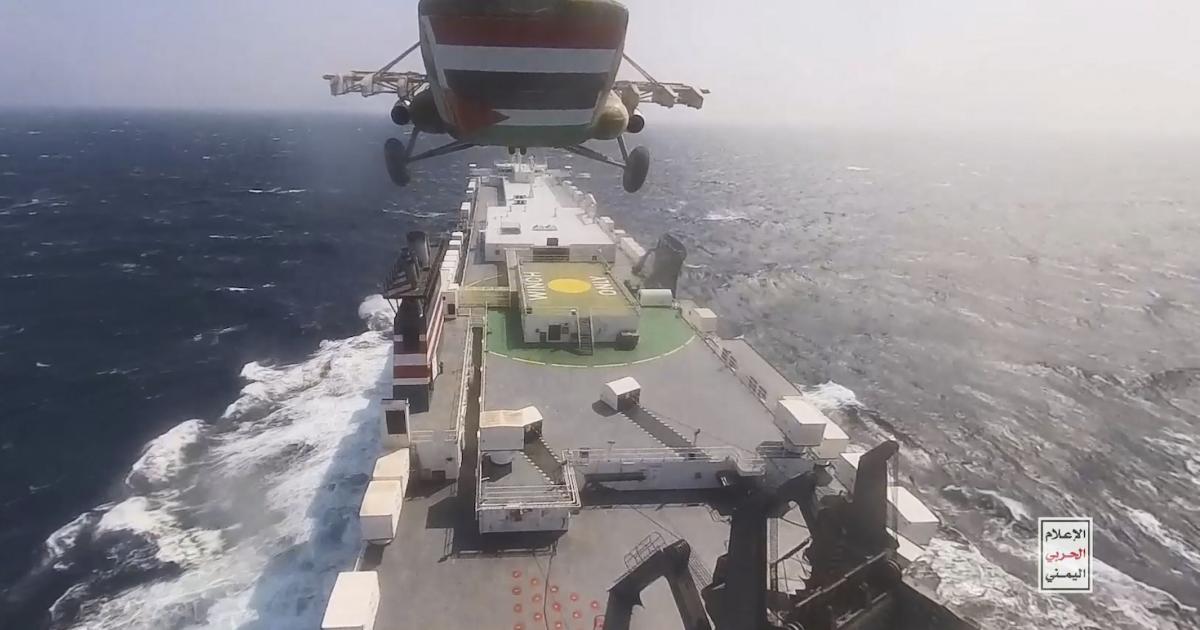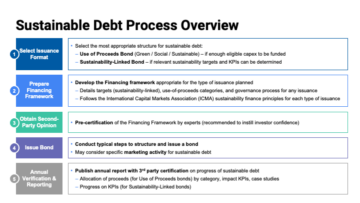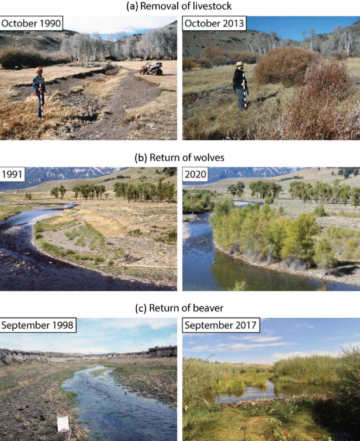
Today we explore the sustainability costs of the crisis unfolding in the Red Sea and its implications for cargo owners and shippers.
In response to Israel’s attacks in Gaza, Iran-backed Houthis in November began attacking cargo ships passing through the Red Sea’s Suez Canal — the same waterway where the 2021 Ever Given ship blockade created widespread global trade issues. The attacks, which operate more like military tactical missions, have been causing disturbances and safety issues for the world’s largest shippers such as Maersk, MSC and Evergreen.
Half of the global container ship fleet that regularly travels the Red Sea is avoiding the route due to the threat of attacks. Roughly 15 percent of global trade passes through the route. Additionally, it’s a critical part of global energy trade — 12 percent of traded oil and 8 percent of liquefied natural gas passes through the Suez Canal.
As Hung Tran, a nonresident senior fellow at the Atlantic Council’s GeoEconomics Center, told Time, “The Red Sea shipping line through the Suez Canal is the shortest, cheapest and most effective way to connect Asia and Africa to Europe via the Mediterranean.”
The situation continues to escalate as U.S. and British forces launched air strikes across Yemen late last week in retaliation, with President Joe Biden stating, “These targeted strikes are a clear message that the United States and our partners will not tolerate attacks on our personnel or allow hostile actors to imperil freedom of navigation.” In response, and with no end in sight, the Houthis said they will continue their attacks on ships in support of Palestinians against Israel. The U.S. has followed up by warning American-flagged vessels to stay out of parts of the Red Sea.
The sustainability implications
As of Jan. 8, carriers had already diverted more than $200 billion in trade. The ships that have not entirely paused operations in the region but aren’t taking the risk of traveling through the Suez Canal must reroute around South Africa’s Cape of Good Hope, adding 10 to 14 days to a typical four- to six-week voyage.
This rerouting is where the sustainability implications come into play, as Gabrielle Reid, an associate director in the strategic intelligence practice of S-RM, a global corporate intelligence and cybersecurity consultancy, told me over email.
“The re-routing of ships around the Cape of Good Hope, South Africa, as insecurity in the Red Sea persists, adds approximately 3,000 nautical miles to a voyage,” Reid said. “Longer routes and increased speeds to minimize scheduling pressures will result in higher fuel consumption, and by corollary, higher emissions.”
Cargo owners could reduce the emissions impact by slow-steaming, where operators run the ship’s engines at lower speeds to save fuel and reduce operating costs. However, this would only “aggravate ‘just-in-time’ scheduling issues and delays,” said Reid. Just-in-time is a common strategy to optimize efficiency by minimizing inventory carrying costs.
Added complexity
The need to reroute ships right now is particularly important because it complicates how cargo shippers respond to the European Union’s Emissions Trading System (ETS). “As of 1 January 2024, under the EU’s ETS maritime emissions are included in the ETS for vessels calling at EU ports, and lengthier routes will mean higher levies for vessels subsequently calling at European ports,” Reid said. Calling refers to a ship’s scheduled stop at a port.
What’s unclear is just how much of an impact the rerouting will have on the cargo owners’ Scope 3 emissions. The scale of impact on emissions and the impact of these disruptions on corporate sustainability objectives will depend on how much longer the issue persists.
Even a temporary disruption of marine operations in the Red Sea for several weeks will have real and immediate consequences globally.
- SEO Powered Content & PR Distribution. Get Amplified Today.
- PlatoData.Network Vertical Generative Ai. Empower Yourself. Access Here.
- PlatoAiStream. Web3 Intelligence. Knowledge Amplified. Access Here.
- PlatoESG. Carbon, CleanTech, Energy, Environment, Solar, Waste Management. Access Here.
- PlatoHealth. Biotech and Clinical Trials Intelligence. Access Here.
- Source: https://www.greenbiz.com/article/navigating-sustainability-costs-red-sea-shipping-crisis
- :has
- :is
- :not
- :where
- $UP
- 000
- 1
- 12
- 14
- 2024
- 7
- 8
- a
- across
- actors
- adding
- Additionally
- Adds
- africa
- against
- AIR
- allow
- already
- an
- analysis
- and
- approximately
- ARE
- around
- AS
- asia
- Associate
- At
- Attacking
- Attacks
- because
- been
- began
- biden
- Billion
- Bloomberg
- British
- but
- by
- calling
- cape
- Cargo
- carrying
- causing
- Center
- cheapest
- clear
- CNBC
- come
- Common
- Connect
- Consequences
- consultancy
- consumption
- Container
- continue
- continues
- Corporate
- Costs
- could
- created
- crisis
- critical
- Cybersecurity
- Days
- delays
- depend
- Director
- Disruption
- disruptions
- due
- Effective
- efficiency
- Electric
- Emissions
- end
- energy
- Engines
- entirely
- escalate
- Ether (ETH)
- EU
- Europe
- European
- EVER
- explore
- fellow
- FLEET
- followed
- For
- Forces
- Free
- Freedom
- Fuel
- GAS
- given
- Global
- global trade
- Globally
- good
- great
- had
- Have
- higher
- hope
- How
- However
- HTML
- HTTPS
- hung
- immediate
- Impact
- implications
- important
- in
- included
- increased
- insecurity
- Intelligence
- into
- inventory
- Israel
- issue
- issues
- IT
- ITS
- Jan
- January
- joe
- Joe Biden
- jpg
- just
- largest
- Last
- Late
- launched
- like
- Line
- longer
- lower
- Maersk
- Marine
- Maritime
- me
- mean
- Mediterranean
- message
- Military
- minimize
- minimizing
- missions
- more
- most
- much
- must
- Natural
- Natural Gas
- navigating
- Navigation
- Need
- Newsletter
- no
- node
- November
- now
- objectives
- of
- Oil
- on
- only
- operate
- operating
- Operations
- operators
- Optimize
- or
- our
- out
- over
- owners
- Palestinians
- part
- particularly
- partners
- parts
- passes
- Passing
- paused
- percent
- persists
- Personnel
- plato
- Plato Data Intelligence
- PlatoData
- Play
- ports
- practice
- president
- president joe biden
- pressures
- real
- Red
- reduce
- refers
- region
- regularly
- Respond
- response
- result
- Reuters
- right
- Risk
- roughly
- Route
- routes
- Run
- s
- Safety
- Said
- same
- Save
- Scale
- scheduled
- scheduling
- scope
- SEA
- senior
- several
- Shipping
- ships
- shortest
- Sight
- sign
- South
- South Africa
- speeds
- States
- stating
- stay
- Stop
- Strategic
- Strategy
- Strikes
- Subsequently
- such
- support
- Sustainability
- sustainable
- system
- tactical
- taking
- targeted
- temporary
- than
- that
- The
- their
- These
- they
- this
- threat
- Through
- time
- to
- told
- trade
- traded
- Trading
- trading system
- transport
- Traveling
- travels
- typical
- u.s.
- unclear
- under
- unfolding
- United
- United States
- vessels
- via
- Voyage
- want
- Way..
- we
- week
- Weeks
- which
- widespread
- will
- with
- would
- zephyrnet










